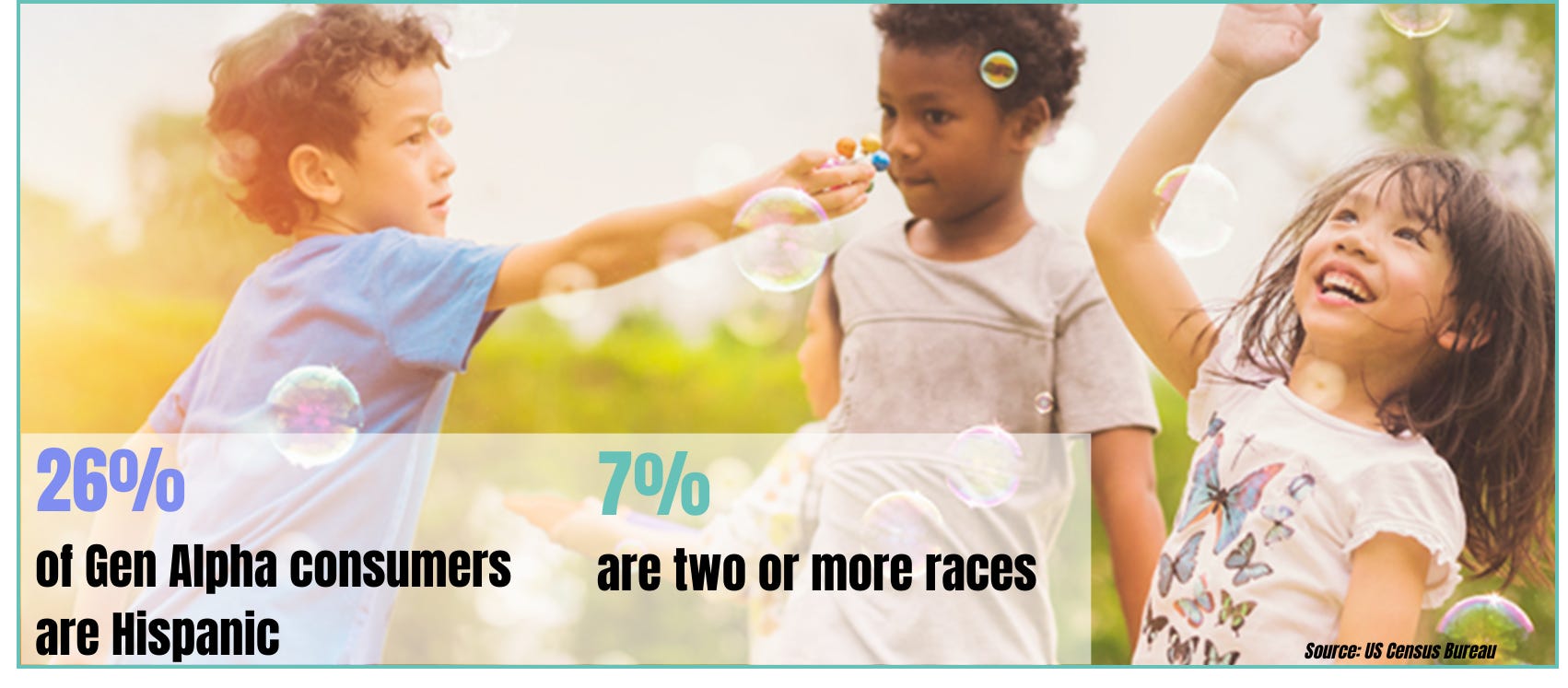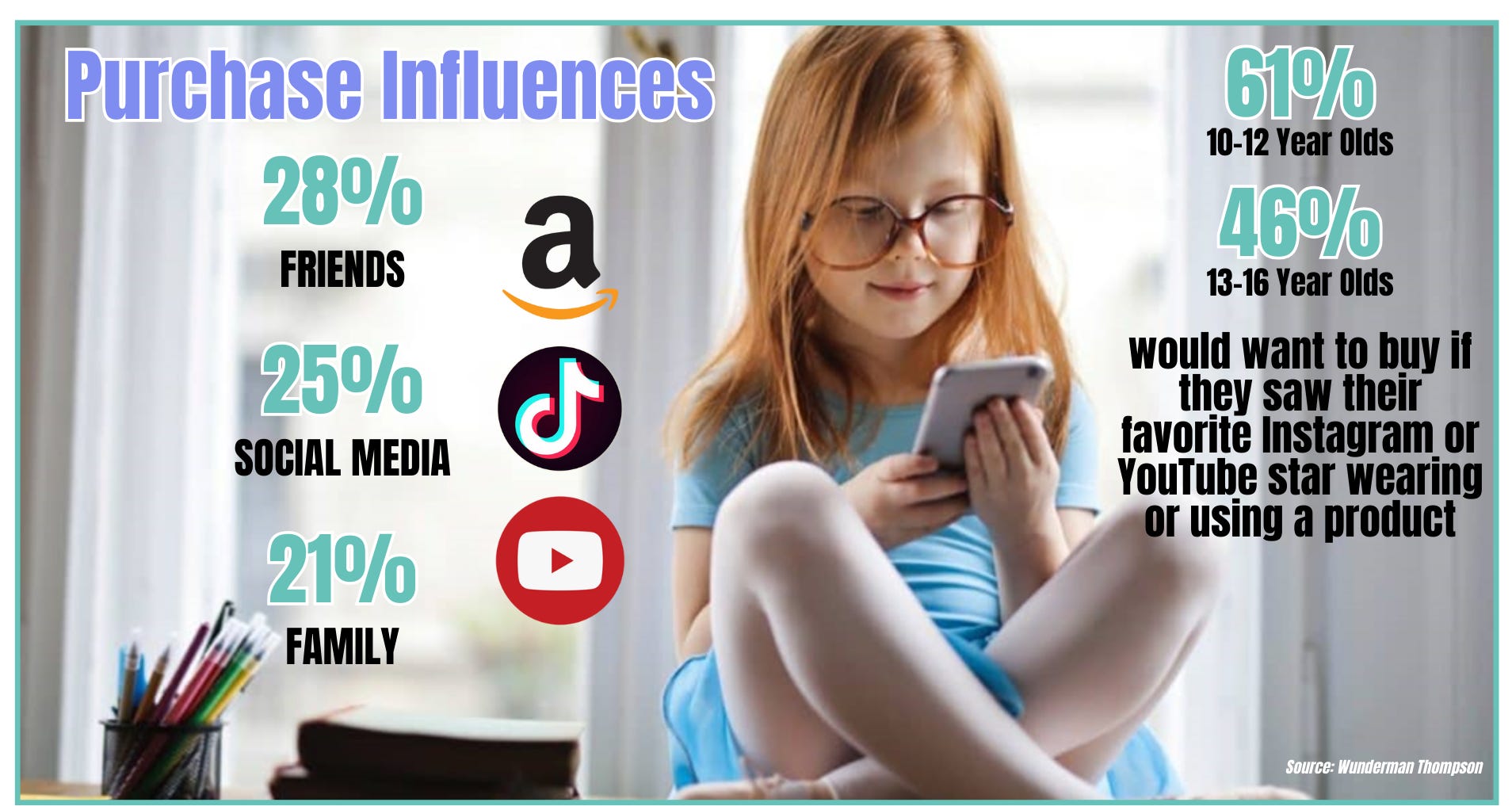The GAP Report: Generation Alpha Predictions
Audiences Uncovered: Generation Alpha
Our in-depth report on Generation Alpha is approximately a 12 minute read. We’ve provided a clickable table of contents below to help navigate, digest, and choose your own adventure. Be sure to bookmark it or save to your favorite read-it-later application.
Table of Contents
Executive Summary
2010, the year of the first iPad…we mean the inception of Gen Alpha. Even though this generation is still young, or not even born yet, they are proving to be on their way to being a powerful generation, expected to be the largest generation yet. This report will dive deep into who Generation Alpha is and predictions on how we see this generation evolving over the upcoming years.
By the Numbers
2.8 million Gen Alphas are born globally each week (McCrindle) with this generation making up 2.2 billion by 2024. (The Future of Commerce)
Representing 13% of the US population and counting, Gen Alpha consumers are more diverse than every other age demographic. Nearly 3 in 10 (26%) Gen Alpha consumers are Hispanic (compared with 19% for the general population) and 7% are two or more races (versus 3% for the overall population). (US Census Bureau data)
65% of Gen Alphas will work in jobs that don’t exist today (McCrindle) and by 2030 they will make up 11% of the workforce. (The Future of Commerce)
36 million Gen Alpha consumers will be internet users this year, exceeding those in the 18-to-24 and 12-to-17 age brackets. (eMarketer)
US Gen Alpha smartphone users will reach 8.8 million this year and grow to 10.2 million by 2026. (eMarketer)
Gen Alphas born in 2020 have a global average life expectancy of 73 years — 16% longer than their Millennial parents. (World Bank)
Who is Gen Alpha?
Gen Alpha is comprised of people born from 2010 to 2025, meaning the oldest of this generation, currently 13, have yet to enter high school and the youngest aren’t even born yet. They are most likely children of millennials and siblings of Gen Z.
As the first generation to be born entirely in the 21st century in a fully digital world, Gen Alpha is constantly being shaped by advancements in technology and the internet. They have the distinct ability to intuitively adapt to new technology faster than their predecessors. Though Gen Alpha has already experienced major world events, they are predicted to grow up to be the most educated and wealthiest generation yet.
Keeping in mind that much of this generation has yet to be born or are still young children, it is imperative to continue to explore their behaviors and attitudes as they age to better understand their values and priorities.
Sources: McCrindle
Implications for the Future of Gen Alpha
A New Social Era - Parental Controls & What This Means for Parents
With the prevalence of screens, rapid advancements in technology, gaming hype, shifting values and increasing privacy concerns, the norms millennial parents are used to when it comes to raising their children are constantly being challenged. Parents are worried their kids are spending too much time on screens, but there may be little parents can do to control that. As it is near impossible for parents to monitor everything their children is doing across their vast digital communities, parents hope that brands and content creators feel a sense of moral responsibility for what they are producing. Brands have the power to influence the platforms to do better when it comes to the safety of young children. With this, there may be an emergence of child or parent friendly influencers creating content that is safe for kids. Brands who take children’s safety to heart, will go long way with parents, winning trust and loyalty.
In addition, parents are also grappling with how to understand the world their children are living in, as new ways of learning such as remote learning and technology first learning are prominent due to COVID-19. They themselves, have to educate themselves on the different ways their children are learning and adopt to those advancements.
For Kenvue this means they must make a stance and do their part in protecting children when it comes to digital communities. Look to partner with influencers that share the values of the brand but also help promote the right communication about digital communities. Girls are putting on makeup earlier than they have in the past. This can be due to kids becoming more savvy around skincare/makeup at a young age as a result of the influence of social media in addition to puberty occurring earlier and earlier in life. Kenvue needs to be a trusted partner to parents and children, providing education and products around proper skincare routines, showing they are there every step of the way.
Experiences Rooted in Authenticity
Born into an era of AI, social media, and personalized tech, Gen Alpha will be most attracted to brands that provide interactivity and exploration. With more screens fighting for attention, experiential activations that incorporate customization will win amongst Gen Alpha. Just as we’ve seen as a standout marker of Gen Z, niche interests and communities will persist with Gen Alpha and with advances in technology happening as we speak, catering to diversity will not only be possible but expected. We predict Gen Alpha will be attracted to the brands that push against stereotypes and instead embrace change, unique perspectives, and really, just reality. We know that this resonates with parents of Gen A as well. For example, campaigns like Women's social network Peanut’s Mother’s day posters last year, highlighting real Mother’s Day experiences of grief and challenges of motherhood, saw significant traction not because it was different from the traditional cheery floral messages but because it deeply resonated with reality. (Brittanica, ANA, Mashable)
For Kenvue, this goes a step farther than representing imperfect skin in creatives. Given that Black dermatologists (3%) and Hispanic dermatologists (4.2%) comprise a very small portion of all dermatologists, increased investment in diversity within dermatology and skin biology will be important to create an educational pipeline for dermatology candidates of color.
For Kenvue knowing Gen Alpha’s strong use and adoption of advanced technology, Kenvue should think of ways to combine technology and products to create innovative experiences for Gen Alpha. For example, AI Product Labels can enable consumers to identify ingredients in specific products in a connective way and even suggest educational materials like skincare/hair care routines based on the different products.
For Kenvue this includes opportunities to push towards normalizing period talk and improving access. Knowing puberty and acne is a top concern of this age group, Kenvue can create puberty care packages that include products and educational materials providing a platform for Gen Alpha adolescence to authentically embrace womanhood improving access through self-care and skin-health brands.
Financial Literacy and Growing Spend
Gen Alpha is expected to be the most financially literate by the time they are teens compared to generations before. About 70% of Gen Alpha are being raised by Millennials, a generation that has been burdened by the 2008 financial crisis, student debt, and a pandemic that was accompanied by mass layoffs and a looming recession. It’s not a surprise that to make things better for their children, many Millennial parents have already started college savings accounts and some even have opened money market accounts and a Roth IRA before their child turns four. A report by the Morning Consult found that “more than half of [millennial] parents have already chatted with their child about spending, savings, and budgeting, and different types of money like cash and credit.” Social media and easy money managing apps are also making financial literacy more accessible, a trend that is only expected to grow as Gen Alpha ages. Greater money management will be important considering Gen Alpha is also projected to drive the growth in the luxury goods sector. A study by Bain and Company found that Gen Z and Gen Alpha’s spending is expected to “grow three times faster than other generations by 2030, occupying a third of the luxury market.” Though Gen Alpha doesn’t necessarily have the financial freedom to spend on luxury goods YET, they do have a significant influence on their parents’ spending habits and are increasingly steering away from fast fashion as they, what we’ve seen with Gen Z, are becoming more concerned with how the items they buy are made and its production impact. With these trends in its infancy, it’s predicted to take full form by the time Gen Alpha reaches their disposable income era. (Morning Consult, Bain and Company, Fortune)
For Kenvue this means Gen Alpha may be more likely to talk the talk AND walk the walk when it comes to spending more for ethically produced products. As we’ve seen with Gen Z, while many support planet positive and ethical ideas, they more often than not settle for what is financially attainable to them over what is the most ethically sound when they get to the register. For Kenvue there’s opportunity in daily use “counter products” to provide the whole package to Gen Alpha. A Neutrogena face cream formulated with efficacious environmentally friendly ingredients, only tested on humans not animals, and produced in a planet positive factory with biodegradable packaging, in an Aesop-esq bottle pretty enough to add to their bathroom décor is a product of Gen Alpha’s dreams, heck, it’s a product of my dreams. However, this time, we predict by the time Gen Alpha reaches their teens they’ll have greater sway with their parents' buying habits and the disposable income Gen Z, or any generation before, didn’t have at that age to purchase it.
Generation Alpha Audience and Media
DIVERSITY/AUTHENTICITY
Gen Alpha will be more diverse than any other generation, prompting a desire for brands to reflect their distinct values and embrace authenticity at their core.
Though they are still young, Gen Alpha is already extremely socially conscious of the world around them and believe it is important media reflects the demographic makeup of our evolved world, specifically within advertisements, TV, and film.
As a generation with the largest multiracial makeup thus far, who are being born within a growing global environmental crisis, their reality is shaping their expectations and attitudes. They’re projected to push and evolve equality, planet positive, and representation initiatives, amongst others, as they age with 1/3 already paying attention to diversity in media (GWI). Though these initiatives are already making strides, we may see a shift in greater expectations from Gen Alpha for big business to take action in exchange for their loyalty. This shift will create a domino effect of differences of opinions and social norms, all culminating to the greatest so called “generation gap” between their elders, and well, us. Specifically, the construct of gender is becoming increasingly more fluid with each generation, with Gen Alpha continuing this acceleration. As Gen Z adults are more likely to report identifying as either trans or nonbinary than any other generation, we believe this will continue in younger kids. Seeing diversity and different representation from brands in media is key as it will allow this generation to be represented and have a seat at the table. ‘What ethnicity are you?’ will not be a simple question based on the growing diversity of this generation. Biracial education around products will show diverse children that there are products that support them regardless of their skin type, skin tone or hair type.
Sources: eMarketer, Purewow, GWI
MEDIA PREFERENCES
Gen Alpha will be looking for even more digital-forward, seamless connective experiences across digital/mobile platforms compared to past generations.
Being born into a world of ever-evolving technology, they have never known a world without the internet or social media. They are constantly being exposed to a vast trove of information and understand the accessibility of connecting with anyone in the world.
Even though they are still so young, it is forecasted that 36M Gen Alpha consumers will be internet users this year with almost two out of three children ages 8 to 11 already having access to a smartphone with high usage of TikTok and YouTube. As they are still growing up, we predict they will continue to use these platforms and think of people they see on them as depictions of role models. (The Future of Commerce)
As technology is always in the forefront of their minds and weaved throughout their everyday lives, they tend to use technological ways of consuming traditional content. Audio is a big player for this generation with audiobooks and podcasts increasing in usage in the past several years.
While they still use social media to stay connected with friends, their social media preferences are evolving from their past generations. They use social media for concrete purposes, using it to enhance their lives rather than letting it be a time suck.
COVID-19 IMPACT
COVID-19 had a heavy impact on Gen Alpha’s childhood and is something that has taken a toll on the way they communicate, leaving them to crave a balance of online/offline experiences.
For those in Generation Alpha that were born slightly before and during the pandemic, childhood has looked very different for them. COVID-19 left Gen Alpha adjusting to their new world at such a young age, not truly understanding what ‘normal’ looked like before the global pandemic. From the way they communicate with others to their presence on social media and their desire to balance online and offline activities, COVID-19 was a main ignitor of behavioral changes. They learned to use screens at an early age to communicate due to the remote schooling efforts. Described as the “New old-fashioned” generation, they crave connection and community growing up in a world of the metaverse, rise in artificial reality and frequent digital facetime. Gen Alpha has even created their own digital language, primarily communicating through emojis and images rather than long-form text. (The Future of Commerce)




PREVIOUS GENERATION IMPACT/INFLUENCE
There is a strong two-way balance between Gen Alpha & Millennial parents when it comes to social values and household decision making.
Generation Alpha is very aware of the world that they are living in and their millennial parents provided a strong influence on their upbringing sharing values of well-being and making the world a better place.
These young minds can grasp concepts that may seem far fetch to others older than themselves. They understand and value the different aspects that make everyone unique and emphasize self-expression. Growing up in a world where new norms are being created everyday, they advocate for what they feel is right.
They have witnessed their parents (70% which are millennials) take a stance on social issues and their parents have already started talking to them around key topics.
Their parents also have gone through The Great Recession, leaving them to educate their kids on being financially literate and taking early steps for financial security.
During the time of the COVID-19 Global Pandemic, kids and parents spent more time together under the same roof, impacting the distribution of balance between the two generations. They began to have similar purchase patterns, resulting in Gen Alpha having a strong influence on household purchase decisions.
When children are around 5 years old, they are able to start attending school and soon learn how to communicate with others. It is around this time that children start to impact household purchases with their parents. This communication leads to the sharing of opinions resulting in peer influence. In addition to peer influence, this generation (ages 5 to 9) are most influenced by stores, TV, and online ads to drive their purchases. Gen Alpha spends time reading reviews and watching shopping content on social media and are big consumers of Amazon paying close attention to comments and reviews. Whether it be on TikTok or Amazon, they are always searching for the next great thing.
Gen Alpha has already shown they are very socially aware, actively looking to make the world a better place just like their millennials and Gen Z counterparts. The theme of environmental consciousness started with Millennials and Gen Z and continues to trickle down. For school age children, some are learning about these social issues in school with others are even taking political action by developing youth-led and organized moments putting more pressure on society and policy makers.
Sources: eMarketer, GWI, The Customer
Extra Credit Resources
Read:
Setting The Financial Stage For Gen Alpha By Engaging Millennial Parents
MEDIUM - Marketing to Generation Alpha: The Digital Natives Redefining Advertising
When Texting Your Teen, Follow These Four (Not So) Simple Rules
Watch:














